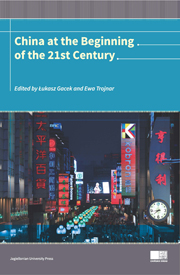Book contents
- Frontmatter
- Contents
- Acknowledgements
- Preface
- Chapter One Dagongmei in the Context of Rural-urban Migration Processes in Contemporary China
- Chapter Two The Linguistic Features of Chinese Internet Language
- Chapter Three Chinese Contemporary Art: Between Market and Freedom
- Chapter Four The Modernization of the People's Liberation Army since 1978
- Chapter Five The Reduced Role of the People's Liberation Army in the Political Succession to Deng Xiaoping and to Jiang Zemin: Chinese Style Civilian-Military Relations in the Making
- Chapter Six Chinese Involvement in Southeast Asia on the Example of Myanmar
- Chapter Seven China's Energy Policy towards Central Asia and Russia
- Chapter Eight Sino-Japanese Dispute over the Seabed Oil and Gas Resources in the East China Sea
- Chapter Nine China's Territorial Disputes in the South China Sea
- Chapter Ten The Way to Hong Kong Handover and its Implications
Chapter Five - The Reduced Role of the People's Liberation Army in the Political Succession to Deng Xiaoping and to Jiang Zemin: Chinese Style Civilian-Military Relations in the Making
Published online by Cambridge University Press: 05 September 2014
- Frontmatter
- Contents
- Acknowledgements
- Preface
- Chapter One Dagongmei in the Context of Rural-urban Migration Processes in Contemporary China
- Chapter Two The Linguistic Features of Chinese Internet Language
- Chapter Three Chinese Contemporary Art: Between Market and Freedom
- Chapter Four The Modernization of the People's Liberation Army since 1978
- Chapter Five The Reduced Role of the People's Liberation Army in the Political Succession to Deng Xiaoping and to Jiang Zemin: Chinese Style Civilian-Military Relations in the Making
- Chapter Six Chinese Involvement in Southeast Asia on the Example of Myanmar
- Chapter Seven China's Energy Policy towards Central Asia and Russia
- Chapter Eight Sino-Japanese Dispute over the Seabed Oil and Gas Resources in the East China Sea
- Chapter Nine China's Territorial Disputes in the South China Sea
- Chapter Ten The Way to Hong Kong Handover and its Implications
Summary
When Jiang Zemin rose to power as Deng Xiaoping's successor in 1989 without any major obstacles from the People's Liberation Army's leadership, it became evident how enormous evolution has the Chinese military undergone. From the Maoist “party-army” of the Long March and the beginning of the People's Republic of China (PRC), it was transformed into an ever-modernising force with its relations with the state organisation more likely to be characterised as resembling “civil-military.” This trend was even reinforced by Hu Jintao's succession in 2002, again under similar circumstances. Truly, the nowadays People's Liberation Army (PLA) plays a significantly less important role in Chinese public affairs than it used to play before. This includes the army's engagement in the issues of political ascendancy and the switch in power. The paper aims at giving some reasons for a limited influence of the army on the succession to both Deng Xiaoping and Jiang Zemin, with an insight into a matter of today's links between the army, the Party and the Chinese state. It traces the evolution of PLA's status in Chinese internal politics from the time of Mao, until the present day, and describes some basic features of the current model of “civil-military relations with Chinese characteristics”.
- Type
- Chapter
- Information
- China at the Beginning of the 21st Century , pp. 63 - 76Publisher: Jagiellonian University PressPrint publication year: 2014



